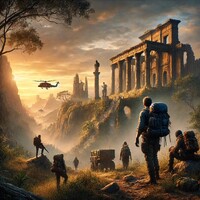Image. The future of travel in an age of conflicts and wars - showing travellers in nature near ancient ruins, with a few soldiers present to reflect the tension of ongoing conflict. Generated by DALL·E 2 - ChatGTP4 from OpenAI.
Countries I have wandered through, with a face glowing with curiosity - now echo with gunfire, clouds of smoke, and a silence that signals something has gone deeply wrong. And some countries I would like to visit: Syria, Sudan, Yemen, Libya, Mali, Ethiopia, Somalia, Russia and Ukraine. So many dreams, shattered by wars. And still… I travel.
Based on information from the Peace Research Institute Oslo (PRIO), 61 armed conflicts occurred across 36 countries in 2024, the highest number recorded since World War II.
According to Geneva Academy for Human Rights, there are more than 110 armed conflicts today (including small-scale skirmishes and minor clashes). Some of these conflicts make the headlines, others do not. Some of them started recently, while others have lasted for more than 50 years.
When the road and doors close, does the journey end? I have been fortunate to visit nearly 100 countries - some of them now lost to war. Places I once walked freely have become battlegrounds.
Now my dreams have been put on hold. Stories interrupted. But even now, I still believe in travel. Because the essence of exploration isn’t always found in a new stamp on a passport. It’s in the people I meet, the voices I hear, and the connections we carry. In a divided world, we need bridges more than ever. Even when borders close, my spirit of adventure lives on.
Sadly, some of the most interesting places to explore have turned into chaos. These places remind us how fragile peace is, and how travel is not just tourism - it’s a connection to people, history, and shared humanity.
For example, Iran - as I have visited: the people there are known for their incredible warmth and hospitality (also based on my experience). It’s also one of the richest historical destinations on earth. If political openness returns, Iran will once again be a jewel for adventure travellers.
I am continuously asking: Where do I go next? And more importantly - is it even safe to go there? After years of crossing borders in search of stories, I have started to question the journey itself. Lately, a new question rose: What does travel mean when the world feels more divided, more violent, more uncertain than ever?
- Is travel still an act of freedom - or has it turned into something more fragile, more uncertain?
- Does crossing borders still mean discovery, or just surviving the next checkpoint?
And of course, I am thinking about all the lost lives and human suffering.
That is a powerful emotional shift for me - fading my joy for travelling. Hopefully I am losing that good feeling - the quiet thrill of stepping into the unknown, meeting kind strangers, standing in front of ancient wonders that whisper old stories.
Once, travel felt like an opportunity for me: connection, curiosity, a kind of magic. Every journey was a chance to be changed by what I saw, who I met, and how far I let myself go. Now, I wonder if that magic is slipping away - replaced by caution, uncertainty and fear. And still… I travel.
Is there still value in crossing oceans, in seeking out the unfamiliar, when the unfamiliar is increasingly shaped by conflicts?
This isn’t just about where to go. It’s about why we go.
Stein Morten Lund, 26th July 2025
Additional information
List of ongoing armed conflicts on Wikipedia:
The following is a list of ongoing armed conflicts that are taking place around the world.
The Universal Declaration of Human Rights (UDHR) is a milestone document in the history of human rights. Drafted by representatives with different legal and cultural backgrounds from all regions of the world, the Declaration was proclaimed by the United Nations General Assembly in Paris on 10 December 1948 by General Assembly resolution 217 A (III) as a common standard of achievements for all peoples and all nations (source: website for United Nations).
“Human rights are rights inherent to all human beings, regardless of race, sex, nationality, ethnicity, language, religion, or any other status. Human rights include the right to life and liberty, freedom from slavery and torture, freedom of opinion and expression, the right to work and education, and many more. Everyone is entitled to these rights, without discrimination.”












